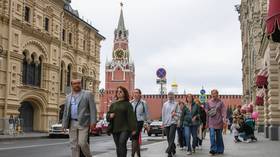Global economic activity ‘slowing down’ – IMF
Inflation could weigh on growth for a long time, requiring even more monetary policy tightening, the head of the agency warns
Global economic activity is slowing, most notably in the manufacturing sector, the chief of the International Monetary Fund (IMF) Kristalina Georgieva said at a meeting of G20 finance ministers and central bank governors on Tuesday.
She noted that the world economy “has shown some resilience” despite “successive shocks in recent years and the rapid rise in interest rates.” Its growth is propped up by strong labor markets and high demand for services, but remains “anemic by historical standards.”
“Activity is slowing, especially in the manufacturing sector. Looking further ahead, medium-term growth prospects remain weak,” Georgieva stated, predicting that advanced economies were likely to see an especially pronounced slowdown, from 2.7% in 2022 to 1.3% by the end of 2023.
Georgieva also noted that inflation, although showing signs of slowing, remains an impediment to economic growth.
“On inflation, there is some encouraging news – the trend is finally downwards. But headline inflation is still too high and core inflation remains sticky despite the significant monetary policy tightening,” she stated, noting that “inflation could remain higher for longer” and would require further interest rate hikes, while “fragmentation could weigh even more on growth.”
Georgieva urged the G20 leaders to “move the global economy onto a more vibrant medium-term path,” which would require both domestic and international policy measures focused on reducing inflation and managing finances responsibly. She noted that these efforts may vary from country to country, and could require collective action, as differences in nations’ economic conditions are a persistent concern for the IMF.
“Some pockets of the global economy are doing well; others are weakening but still growing; and vulnerable countries are falling further behind… To protect the most vulnerable countries and their people, we need to strengthen the global financial safety net,” she said.
“While advanced and strong emerging market economies have a cushion of more than $10 trillion in international reserves, the rest of the world relies on pooled resources of international institutions such as the IMF.”
Georgieva urged global leaders to implement reforms that promote business growth and job creation.
For more stories on economy & finance visit RT’s business section
You can share this story on social media:








Comments are closed.